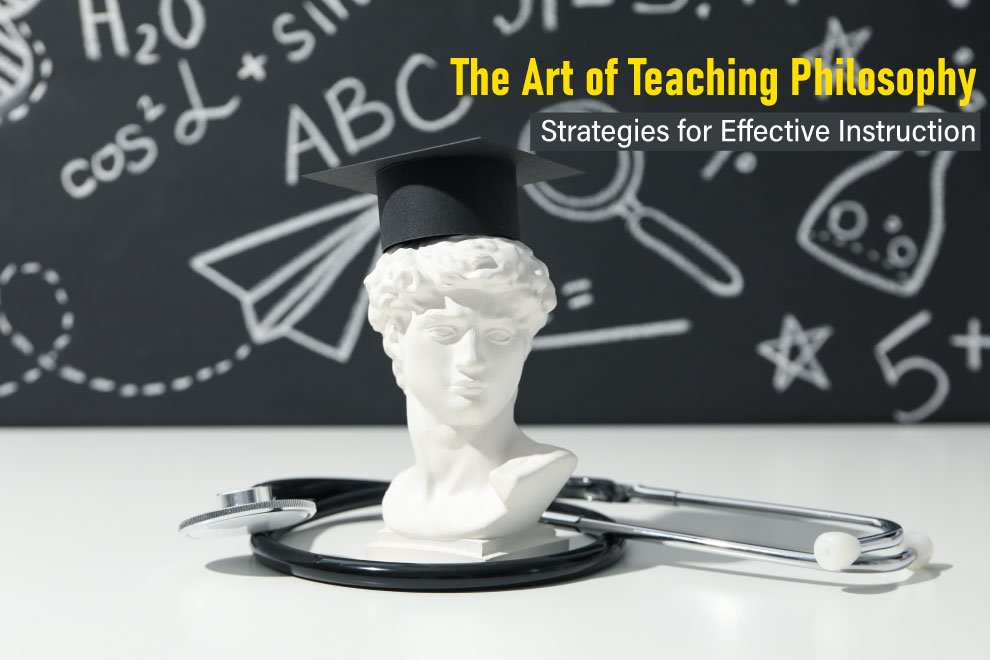Teaching philosophy is a nuanced endeavor that requires a deep understanding of the subject matter and effective instructional strategies. Educators seeking to engage their students in philosophical discourse and critical thinking must approach their craft with purpose and finesse. This article explores strategies for effective instruction in teaching philosophy, offering insights into fostering a rich and enlightening learning experience.
1. Establish Clear Learning Objectives
The foundation of effective teaching in philosophy begins with setting clear learning objectives. These objectives serve as a roadmap for both educators and students, providing a clear understanding of what will be achieved by the end of a course or lesson. When crafting learning objectives, it’s essential to develop critical thinking, ethical reasoning, and a deeper understanding of philosophical concepts.
2. Encourage Active Participation
Engagement is key in philosophy instruction. Encouraging active participation in the classroom stimulates critical thinking and facilitates the exploration of complex philosophical ideas. Utilize Socratic questioning techniques to provoke thoughtful discussion and debate among students. This deepens their understanding and cultivates a sense of intellectual curiosity.
3. Foster a Collaborative Learning Environment
Philosophy thrives in an environment where students can freely exchange ideas and challenge one another’s beliefs. Creating a collaborative learning atmosphere is vital for effective philosophy instruction. Encourage respectful dialogue and debate, allowing students to learn from each other’s perspectives. Educators can instill important values in their students by fostering open-mindedness and empathy.
4. Incorporate Diverse Perspectives
Philosophy encompasses a wide array of perspectives, traditions, and cultures. To provide a comprehensive education, it’s crucial to incorporate diverse philosophical viewpoints into your teaching. Expose students to philosophical traditions, including Western, Eastern, and contemporary thought. This exposure not only broadens their knowledge but also fosters a deeper appreciation for the complexities of philosophy.
5. Employ Case Studies and Real-Life Applications
Theoretical discussions in philosophy can sometimes seem abstract and detached from real-life scenarios. To bridge this gap, employ case studies and real-life applications of philosophical concepts. This approach helps students see the practical relevance of philosophy in addressing ethical dilemmas, moral quandaries, and societal issues. It also encourages them to apply philosophical principles to their own lives.
6. Emphasize Critical Reading and Writing Skills
Philosophy relies heavily on the analysis of complex texts and the articulation of well-reasoned arguments. To equip students with the necessary skills, emphasize critical reading and writing throughout your instruction. Teach them to dissect philosophical texts, identify key arguments, and formulate concise and persuasive responses. These skills are not only valuable in philosophy but also in various other academic and professional pursuits.
7. Provide Constructive Feedback
Feedback plays a pivotal role in the growth of philosophy students. Offer constructive feedback on their written assignments and oral presentations, focusing on developing their critical thinking and communication skills. Encourage self-reflection and revision, guiding them toward greater clarity and coherence in their philosophical inquiries.
8. Create a Thoughtful Syllabus
A well-structured syllabus is the backbone of any philosophy course. Ensure that your syllabus is thoughtfully organized, with a logical progression of topics. Provide students with a clear understanding of the course’s expectations, grading criteria, and assignment deadlines. A transparent syllabus sets the stage for a successful learning experience.
9. Cultivate Ethical Reasoning
Ethical reasoning is at the heart of many philosophical inquiries. In your instruction, focus on cultivating students’ ability to analyze moral dilemmas and make ethically sound decisions. Encourage them to consider the consequences of their actions and explore the ethical implications of various philosophical theories.
10. Stay Informed and Adaptable
Philosophy is a dynamic field with ongoing debates and evolving perspectives. To be an effective philosophy instructor, it’s crucial to stay informed about current philosophical discourse and adapt your teaching strategies accordingly. Encourage students to engage with contemporary philosophical issues and contribute to the ongoing conversation.
11. Promote Philosophical Reflection
To deepen students’ engagement with philosophy, promote the habit of philosophical reflection. Encourage them to contemplate profound questions, both inside and outside the classroom. Assign reflective journals or thought-provoking prompts that challenge them to apply philosophical concepts to their experiences and beliefs. By encouraging ongoing reflection, you nurture the development of philosophical thinking as a lifelong practice.
12. Embrace Technology Thoughtfully
Incorporating technology can enhance philosophy instruction when used thoughtfully. Utilize online forums, discussion boards, and virtual classrooms to facilitate philosophical discourse beyond the confines of physical classrooms. These digital tools can also provide access to many philosophical resources, such as academic journals and multimedia presentations, broadening students’ exposure to philosophical ideas. However, it’s essential to balance technology and in-person interaction to maintain the depth and richness of philosophical discussions.
In conclusion, teaching philosophy is indeed an art that requires a blend of pedagogical expertise and a profound understanding of the subject matter. Educators can effectively guide students through critical thinking and ethical exploration by establishing clear learning objectives, fostering active participation, and creating a collaborative and inclusive learning environment. Incorporating diverse perspectives, real-life applications, and a focus on critical reading and writing skills further enriches the educational experience. Finally, the cultivation of ethical reasoning and a commitment to staying informed and adaptable ensure that philosophy instruction remains a vibrant and enlightening endeavor.
ALSO READ: 5 Prodigies With The Highest IQ in the World









